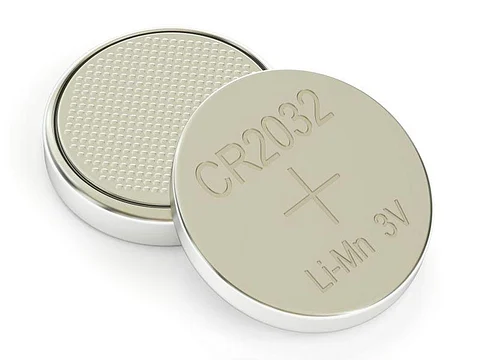FRIDAY, May 27, 2022 (HealthDay News) -- Those button batteries that power your watch, key fob and other devices can be deadly if a child swallows them, and researchers want to make the danger clear.
The tiny but powerful batteries can burn holes in a child's throat, paralyze vocal cords or fuse their esophagus and trachea together. In severe cases, burning can continue into a major vein or artery, causing a fatal loss of blood.
"If you have young children in the house, make sure that you keep devices with button batteries away from them or at least make sure that you're monitoring them when they're using it and check that if their devices have button batteries that are screwed in or locked into place," said Dr. Nikolaus Wolter, co-author of a new research review published May 26 in JAMA Otolaryngology-Head & Neck Surgery.
Although these injuries are relatively rare, they have gotten worse as devices use more powerful lithium batteries, said Wolter, an otolaryngologist (specialist in diseases of the ear, nose and throat) at the Hospital for Sick Children at the University of Toronto.
"Most of the time, nobody knows that they have swallowed a battery, and when we find out, it's often too late," he said.
When a child swallows a button battery, it can get stuck in a narrow part of the esophagus. Should this happen, the poles of the battery connect and create an electrical current. Though the current itself doesn't cause injury, it splits water into hydrogen gas and hydroxide free radicals, resulting in a base that burns, Wolter explained.
"Those burns are the opposite of acid burns and are much worse," he said. "They cause a very deep and penetrating injury that can get really deep into tissues in the esophagus and important structures like your aorta and your trachea. When these injuries happen, they're very, very bad."
That's why any parent who thinks their child has swallowed a battery should get him or her to an emergency room as soon as possible.
Once the battery has been removed, it's important to stay vigilant. If a child develops respiratory symptoms, such as chronic cough, wheeze or choking when swallowing, or changes in the voice, take him or her to a doctor and let the doctor know the child had swallowed a button battery, Wolter said.
For the new study, the researchers reviewed 195 cases in which young children (average age: 18 months) swallowed button batteries. On average, six days elapsed between swallowing the battery and its removal.
The most common consequences were paralysis of the vocal cord and fusing of the trachea and esophagus, researchers found.
The conditions required some children to have a tracheostomy, an opening in the windpipe to aid breathing, or to have a feeding tube to receive nourishment. Researchers noted that vocal cord paralysis occurred sooner than other injuries.
Fourteen children died from battery-ingestion injuries, Wolter said.
Dr. Kris Jatana, director of clinical outcomes for the surgical services at Nationwide Children's Hospital in Columbus, Ohio, is co-author of an editorial published with the findings.
"Too many children have been seriously injured or lost their life due to ingestion of a button battery," he said. "Prevention of these injuries is critical."
Jatana noted that button batteries lodged inside the body can rapidly cause tissue to liquefy, which can lead to life-threatening injuries. Some injuries cannot be easily repaired with surgery, he said.
"Ultimately, a safer button battery technology that can reduce or eliminate severe esophageal injuries is critically needed," Jatana said.
A proposed law that would require child-resistant compartments in products containing button batteries is under U.S. Congressional review. Dubbed Reese's Law, it's named after a 18-month-old Texas child who died after swallowing a button battery, despite several surgical attempts to save her life.
To prevent children from swallowing these batteries, Jatana recommends:
- Routinely checking every battery-powered device in your home and making sure that the battery compartment is secured. He noted it is best to use electronic devices where the battery can only be accessed using a tool, such as a screwdriver. If the battery compartment is not secure, keep the device out of children's sight and reach.
- Disposing of spent batteries carefully. When changing button batteries in a device, cover the battery completely with household tape and immediately discard it. Even a spent battery that can no longer power a device can cause injury inside the body.
- Storing all loose batteries in a locked cabinet or box, out of reach or sight of children.
More information
For more about the dangers of button batteries, visit the American Academy of Pediatrics.
SOURCES: Nikolaus Wolter, MD, MSc, otolaryngologist, Hospital for Sick Children, University of Toronto, Ontario, Canada; Kris Jatana, MD, director, clinical outcomes for surgical services, Nationwide Children's Hospital, Columbus, Ohio; JAMA Otolaryngology–Head & Neck Surgery, May 26, 2022, online


